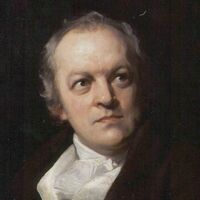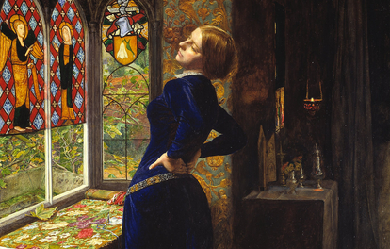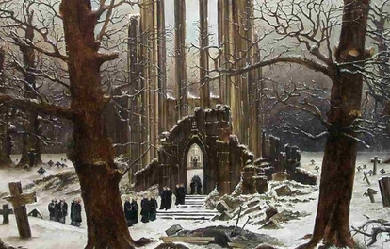Gwin, King of Norway
COME, kings, and listen to my song:
When Gwin, the son of Nore,
Over the nations of the North
His cruel sceptre bore;
The nobles of the land did feed
Upon the hungry poor;
They tear the poor man’s lamb, and drive
The needy from their door.
‘The land is desolate; our wives
And children cry for bread;
Arise, and pull the tyrant down!
Let Gwin be humblèd!’
Gordred the giant rous’d himself
From sleeping in his cave;
He shook the hills, and in the clouds
The troubl’d banners wave.
Beneath them roll’d, like tempests black,
The num’rous sons of blood;
Like lions’ whelps, roaring abroad,
Seeking their nightly food.
Down Bleron’s hills they dreadful rush,
Their cry ascends the clouds;
The trampling horse and clanging arms
Like rushing mighty floods!
Their wives and children, weeping loud,
Follow in wild array,
Howling like ghosts, furious as wolves
In the bleak wintry day.
‘Pull down the tyrant to the dust,
Let Gwin be humblèd,’
They cry, ‘and let ten thousand lives
Pay for the tyrant’s head.’
From tow’r to tow’r the watchmen cry,
‘O Gwin, the son of Nore,
Arouse thyself! the nations, black
Like clouds, come rolling o’er!
Gwin rear’d his shield, his palace shakes,
His chiefs come rushing round;
Each, like an awful thunder cloud,
With voice of solemn sound:
Like rearèd stones around a grave
They stand around the King;
Then suddenly each seiz’d his spear,
And clashing steel does ring.
The husbandman does leave his plough
To wade thro’ fields of gore;
The merchant binds his brows in steel,
And leaves the trading shore;
The shepherd leaves his mellow pipe,
And sounds the trumpet shrill;
The workman throws his hammer down
To heave the bloody bill.
Like the tall ghost of Barraton
Who sports in stormy sky,
Gwin leads his host, as black as night
When pestilence does fly,
With horses and with chariots—
And all his spearmen bold
March to the sound of mournful song,
Like clouds around him roll’d.
Gwin lifts his hand—the nations halt;
‘Prepare for war!’ he cries—
Gordred appears!—his frowning brow
Troubles our northern skies.
The armies stand, like balances
Held in th’ Almighty’s hand;—
‘Gwin, thou hast fill’d thy measure up:
Thou’rt swept from out the land.’
And now the raging armies rush’d
Like warring mighty seas;
The heav’ns are shook with roaring war,
The dust ascends the skies!
Earth smokes with blood, and groans and shakes
To drink her children’s gore,
A sea of blood; nor can the eye
See to the trembling shore!
And on the verge of this wild sea
Famine and death doth cry;
The cries of women and of babes
Over the field doth fly.
The King is seen raging afar,
With all his men of might;
Like blazing comets scattering death
Thro’ the red fev’rous night.
Beneath his arm like sheep they die,
And groan upon the plain;
The battle faints, and bloody men
Fight upon hills of slain.
Now death is sick, and riven men
Labour and toil for life;
Steed rolls on steed, and shield on shield,
Sunk in this sea of strife!
The god of war is drunk with blood;
The earth doth faint and fail;
The stench of blood makes sick the heav’ns;
Ghosts glut the throat of hell!
O what have kings to answer for
Before that awful throne;
When thousand deaths for vengeance cry,
And ghosts accusing groan!
Like blazing comets in the sky
That shake the stars of light,
Which drop like fruit unto the earth
Thro’ the fierce burning night;
Like these did Gwin and Gordred meet,
And the first blow decides;
Down from the brow unto the breast
Gordred his head divides!
Gwin fell: the sons of Norway fled,
All that remain’d alive;
The rest did fill the vale of death,
For them the eagles strive.
The river Dorman roll’d their blood
Into the northern sea;
Who mourn’d his sons, and overwhelm’d
The pleasant south country.
Poetical Sketches




